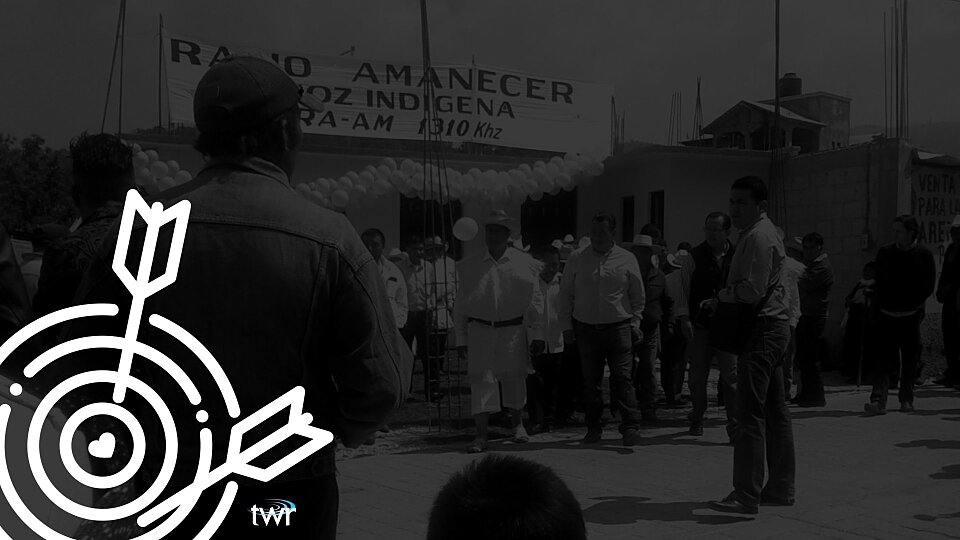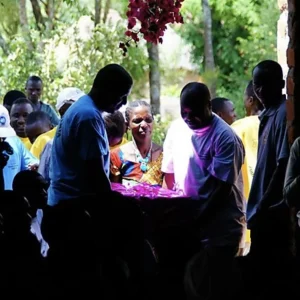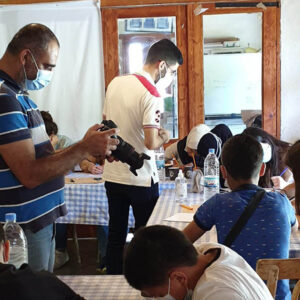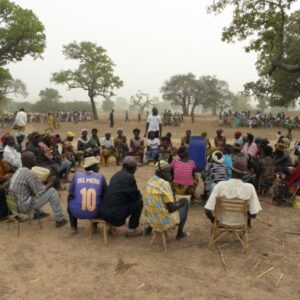 How do you see persecution? According to Open Doors, 1 in 8 Christians worldwide experiences persecution for their faith. That’s 1 in 8 of us whose faith can come at great cost — in some cases, even at the cost of life itself. This month, in response to this painful statistic, we will be sharing stories in solidarity with our brothers and sisters who so often live out their faith in the shadows. We pray this would shine a light in the otherwise-darkened corners of our world and connect us all to these hidden members of the body of Christ.
How do you see persecution? According to Open Doors, 1 in 8 Christians worldwide experiences persecution for their faith. That’s 1 in 8 of us whose faith can come at great cost — in some cases, even at the cost of life itself. This month, in response to this painful statistic, we will be sharing stories in solidarity with our brothers and sisters who so often live out their faith in the shadows. We pray this would shine a light in the otherwise-darkened corners of our world and connect us all to these hidden members of the body of Christ.
“We were expelled from our land because of the gospel.”
That’s Sebastian Perez’s blunt yet understated explanation of how he comes to be writing on behalf of his community of Mayan evangelicals in southern Mexico. For most readers, it’s startling to hear about the forced deconversions, beatings, sexual abuse and machete attacks that occurred in a nation whose population is described as overwhelmingly Christian.
In his letter to a TWR national partner in Mexico, Radio Encuentro International (in English, Radio Encounter), Perez explained why he and the Betania community sought the help of the media ministry to establish a 3,000-watt AM radio station. Despite decades of intense persecution, the people of Betania aren’t motivated by understandable fear or revenge but instead by the desire to share the gospel with their region as a whole and with the next generation.
 Religious Conflict Leads to Attacks
Religious Conflict Leads to Attacks
Perez’s story begins in the 1960s in San Juan Chamula, a town in the state of Chiapas whose name has surfaced often in international media reports about the religious conflict there. The dominant religion of the area is an amalgam of Catholicism and Mayan paganism, its worshippers still revering the underworld deity Kukulkan.
Evangelicals refused to participate in local rituals – which involve heavy drinking, shamans and animal sacrifice – and these believers were labeled a threat to local harmony and consensus. They were targeted for intimidation, with girls being sexually abused, women mistreated, children beaten, men tied to posts and beaten and then taken to jail.
Some of them were hauled before local authorities, who demanded that they renounce their faith. Those who wouldn’t yield were expelled.
“Some fled to the mountains, but at night they were taken by surprise, and their houses were burned,” Perez said. “Many brothers were burned, macheted, killed. One of them was the first indigenous preacher.”
By 1994, Perez said, 34,000 evangelicals “were thrown into exile, dispossessed of our lands. We left empty-handed.”
Through the years, many of the exiled evangelicals moved about 20 miles to the southeast and settled new communities. One was called Nueva Esperanza, or New Hope, and another took the name Betania, from the New Testament town known in English as Bethany.
Re-evangelizing the Next Generation
Eventually, however, these men and women who had paid such a high price to remain true to Jesus Christ realized that another critical challenge had emerged to face them: How would they pass on this legacy to their children?
“The adults who lived through the persecution keep their lamps of faith burning,” he said. “But, unfortunately, faith is diminishing in the young people. They did not see the sufferings of the first Christians. These young people of Christian parents today are into alcoholism, drugs and other vices. Some men and women have left their faith.”

The community legally established the Civil Association in 2002 to “rehabilitate what had been lost” and then go further.
“The main goal of the Civil Association was to establish a radio station because we believe that with a tool like this, we can take the gospel to nonbelievers not only in [our immediate area] but also in all parts of Chiapas and parts of Guatemala,” Perez wrote.
The Betania vision came into focus at about the time Radio Encuentro was seeking community groups around Mexico interested in setting up local radio stations. Michael Escalante, who has dual U.S.-Mexican citizenship and was founder of the organization, said Mexico doesn’t permit overtly religious organizations to own stations but does allow community groups to own stations that proclaim the good news of Jesus Christ.
Helping Christians Start Stations
Radio Encuentro doesn’t own and operate stations, Escalante said. Instead, it identifies local groups interested in broadcasting the gospel and then guides them in organizing boards, navigating the lengthy and complicated process of applying for a government concession (the equivalent of broadcast licenses in the U.S.), raising money, arranging for equipment, and getting the stations up and running.
“Betania was who received the very first permit to build a 24/7 Christian radio station, the first one that the government has approved,” Escalante said. “And just like in the upper room, when the Lord came through the wall after he resurrected and appeared to his disciples, so the Lord broke through the legal wall in Mexico and permitted this miracle.”
Since the 2017 launch of Betania broadcasting, known as Radio Amanecer (Radio Dawn) 1310 AM, Radio Encuentro has signed a national partnership agreement with TWR. This partnership then went on to assist two more stations get established and on air: Radio Bacalar, 89.7 FM, in the state of Quintana Roo and Radio La Estacion, 96.3 FM, in Poza Rica. Other stations are in the works.
“God has just busted the door wide open, and he’s used Radio Encuentro as a vehicle to do it,” Escalante said. “People in Mexico are still shaking their heads and saying, ‘How can this be?’ When the Lord says he wants to do something, he does it.”
Hope Amid Continuing Persecution
The persecution of evangelicals continues back in Chamula, said Alejandro Vieyra, national director for Radio Encuentro in Mexico. Some believers have been evicted at night, with large vehicles arriving to destroy their houses and leave the land bare by the following morning, as if no one had ever lived there.
But Radio Amanecer brings hope to the airwaves. Its broadcasts in the languages of Tzotzil, Tzeltal, Tojolabal and Spanish are producing results.
“Incarcerated people are listening, and testimonies have been received from people who are now believers and have experienced the freedom found in Jesus Christ,” Vieyra said. “Also, young people with addictions who are listening to the programs have experienced changes. Listeners call the station asking for advice and materials that will allow them to grow more in the Word of God.”
Perez closes his letter to Radio Encuentro, TWR and supporters of the ministries with these words:
“Thank you. In Tzotzil, my language, we would say, ‘Colavalic!’”
« Thru the Bible Gives Suicidal Man a Reason to Live Proclaimers: packing a powerful message »










